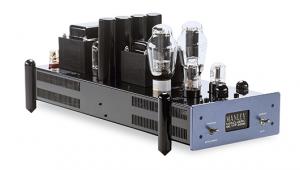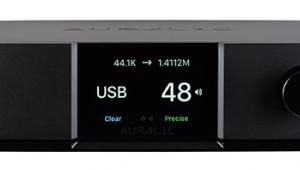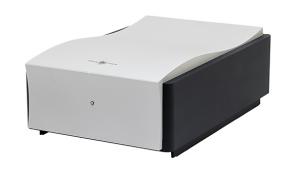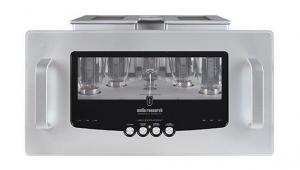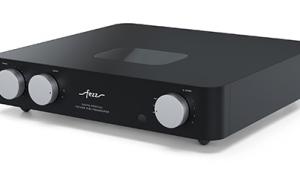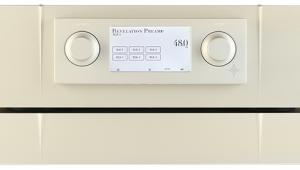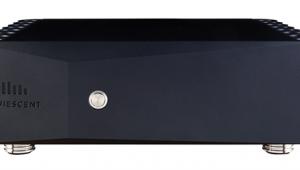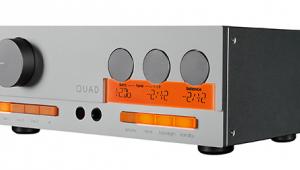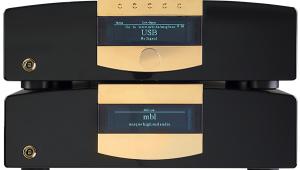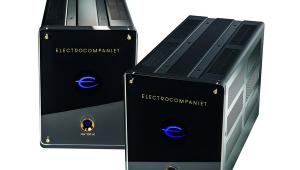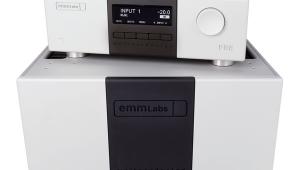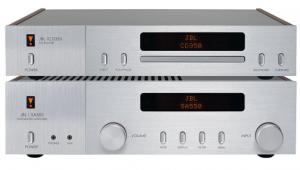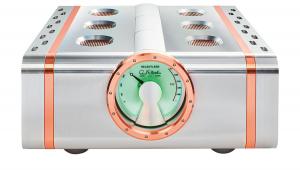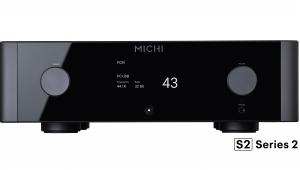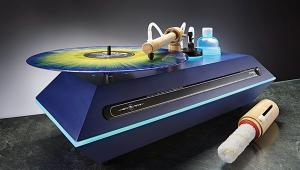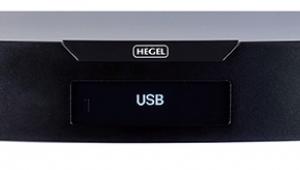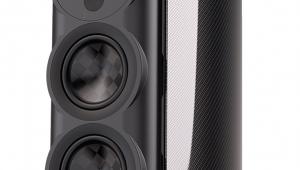Electrocompaniet EC 4.8 MKII/AW 800 M Pre/Power Amplifier Lab Report
Electrocompaniet EC 4.8 MKII
With no RIAA phono stage or integrated DAC on board – the ECP 2 MKII and ECM1 MKII, respectively, cater for these options as separates in their own right – the EC 4.8 MKII remains a purist, fully analogue line preamplifier. Maximum gain is +4.8dB, or x1.7 (balanced in/out), and while the residual noise is held to a fabulously low –99.6dBV (10.5µV) the 92.5dB A-wtd S/N ratio (re. 0dBV) is just a few dB higher than anticipated. This is a function of white noise rather than hum, so anyone thinking of pressing the EC 4.8 MKII into service as a headphone amplifier – via a suitable XLR- or RCA-6.35mm adapter – and especially if driving sensitive in-ears, should bear this in mind. Low impedance 'phones are also better driven from low impedance sources (see p53) so the admittedly very flat 101ohm [red trace, Graph 1] remains better suited to the 330kohm AW 800 M than a 32ohm headphone. The line frequency response is otherwise very flat and extended [black trace, Graph 1] reaching down to 3Hz/–1dB and up to 100kHz/–0.62dB.
Within the 20Hz-20kHz audioband, distortion is very low indeed at just 0.00012-0.00035% (re. 0dBV), rising fractionally to 0.00075%/40kHz [see Graph 2, below]. Like other preamps with exceptional ultrasonic compensation, this suggests the EC 4.8 MKII will avoid the in-band IMD that might otherwise be caused by the hump of requantisation noise accompanying DSD64 media, for example. The EC 4.8 MKII's maximum 21V balanced output is arguably excessive (the AW 800 M requires 1.7V to raise 2x300W/8ohm) but the intelligent layout achieves a >90dB stereo separation and ±0.05dB channel balance over the major portion of its digitally-governed ~100dB range. PM
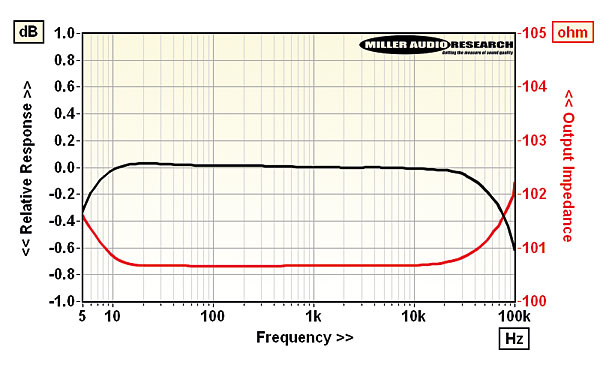
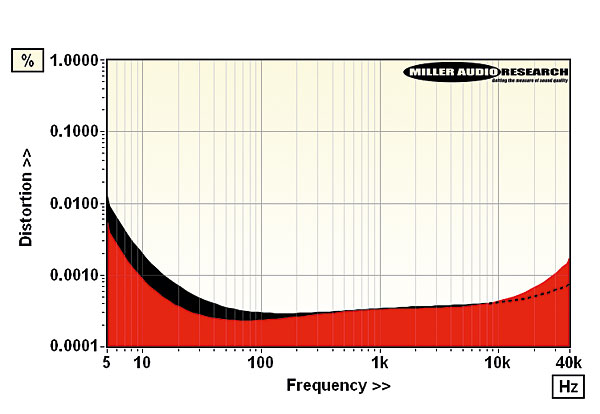
| Maximum output (<1% THD, 47kohm) | 21Vrms (Balanced) |
| Maximum input level (<1% THD) | >12Vrms (Balanced) |
| Output impedance (20Hz–20kHz) | 101ohm (Balanced) |
| Freq. response (20Hz–20kHz/100kHz) | +0.03dB to –0.02dB / –0.62dB |
| Input sensitivity (re. 0dBV) | 574mV (Balanced) |
| A-wtd S/N ratio (re. 0dBV) | 92.5dB |
| Distortion (20Hz-20kHz re. 0dBV) | 0.00012–0.00035% |
| Power consumption | 22W (1W standby) |
| Dimensions (WHD) / Weight (total) | 470x80x372mm / 11.3kg |
Rated at 300W/8ohm per channel in its single chassis/stereo guise, Electrocompaniet's flagship power amplifier eases past its specification at 2x320W/8ohm and 2x580W/4ohm with 364W, 714W, 1352W and 1854W available to support transient peaks (all re. 1kHz/10msec/<1% THD) into 8, 4, 2 and 1ohm loads, respectively. Both the 2ohm and 1ohm figures are limited by onboard over-current protection [see Graph 1, below] but the AW 800 M's 43.1A capability is more than sufficient to buffer its (voltage) output into the most difficult of speaker loads. More power, but no more current, is available into 8/4ohm loads when the AW 800 M is operated in bridged/mono mode. In stereo mode, distortion is very low right from switch on, the amp achieving 0.0003% at 1kHz/10W with the heatsinks at ambient (20oC), increasing to just 0.0007% after 30mins (55oC).
Versus power, distortion increases very gently from a low 0.00035% between 1-10W up to 0.001%/100W and 0.0029% at the rated 300W (all re. 1kHz/8ohm). Versus frequency the trend is also impressively uniform – just 0.00035-0.0021% at 10W from 20Hz-20kHz – with no abrupt jump in THD through the high treble [see Graph 2, below]. Gain is a sensible 29.4dB, bringing the total pre/power gain to a very useable +34.2dB via its balanced XLR connections, and noise is very low, yielding an impressively wide 95.8dB A-wtd S/N ratio (re. 0dBW). The response is flat to tight –0.5dB limits from 1Hz-45kHz/8ohm but Electrocompaniet's claim for a super-wide '>1000' damping factor could not be verified – the amplifier's 0.013-0.047ohm output impedance gives closer to >600 at bass frequencies, which is still a fine result. PM
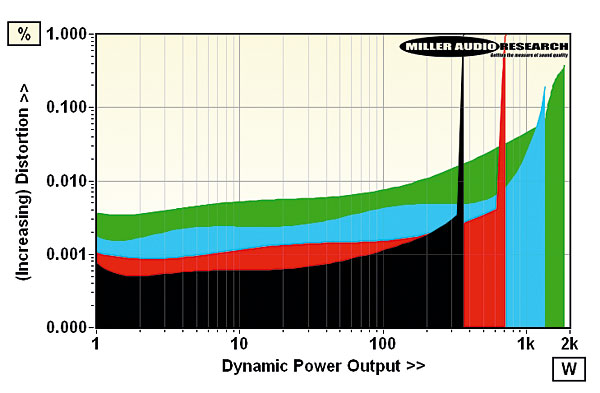
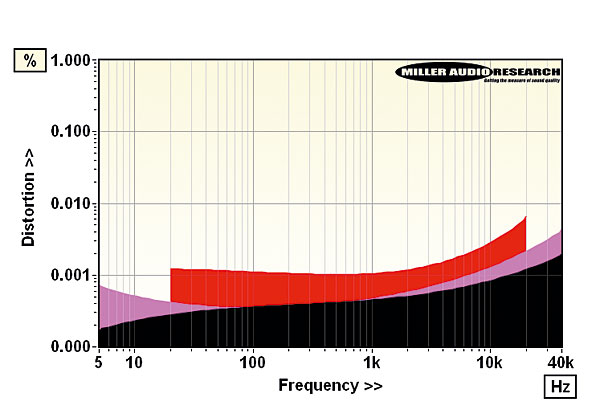
| Power output (<1% THD, 8/4ohm) | 320W / 580W |
| Dynamic power (<1% THD, 8/4/2/1ohm) | 364W/714W/1352W/1854W |
| Output imp. (20Hz–20kHz/100kHz) | 0.013–0.047ohm / 0.36ohm |
| Freq. resp. (20Hz–20kHz/100kHz) | +0.0dB to –0.15dB/–1.6dB |
| Input sensitivity (for 0dBW/300W) | 96mV / 1700mV |
| A-wtd S/N ratio (re. 0dBW/300W) | 95.8dB / 120.5dB |
| Distortion (20Hz-20kHz, 10W/8ohm) | 0.00035-0.0021% |
| Power consumption (Idle/Rated o/p) | 180W / 945W (1W standby) |
| Dimensions (WHD) / Weight | 406x292x488mm / 55kg |
| Prices | £3599/£19,500 (pre/power amp) |


